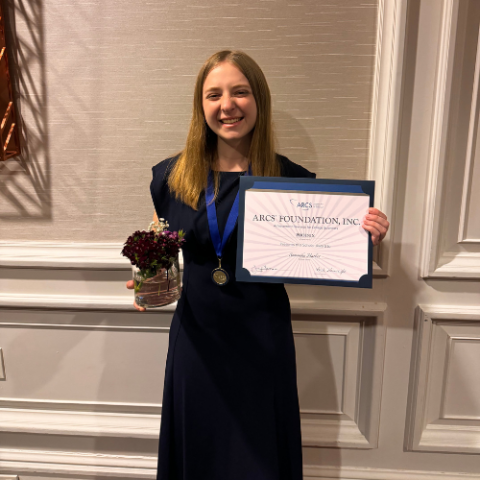Samantha Harker has many descriptors, including as an ARCS Scholar and PhD candidate in neuroscience at Arizona State University (ASU). She is also a recipient of two recent predoctoral fellowships – from the National Institute of Mental Health and the other from the Autism Science Foundation.
She is smart and passionate about science – in middle school Harker won her school’s annual Pi memory competition three times, reciting the first 1,294 digits of the irrational number from memory in eighth grade.
Harker was diagnosed with autism in her teen years. The diagnosis helped her “make a sense of why I struggled a lot with socializing with people my age, and why my interests were a lot different from most of the other girls that were my age,” she explains. Boosted by an independent study track and community college classes during high school, “I ended up finishing high school when I was 16,” she says.
“When I did get into college, I was already at a junior standing when I started. And so, I just kept taking more sciences classes,” Harker continues.
By the age of 18, she had earned two bachelor’s degrees. One from ASU in English and the other in Medical Humanities from the University of Health Sciences and Pharmacy. When researching graduate programs with an autism research focus, Harker discovered her current mentor at ASU who “ended up having funding for a new project to study sex differences in autism, while also looking at genomics to explain differences in aging outcomes for the autistic adult population.” That’s where Harker is doing her PhD research.
“I work under two principal investigators. Dr. Blair Braden focuses on autism and aging, and Dr. Candace Lewis investigates psychedelics, genomics, neuroimaging, and mental health. My project is kind of a fusion of the two.” Working in the Brain Epigenetics and Altered States and Autism and Brain Aging labs at ASU, Harker investigates genetic links between autism and neurodegenerative diseases, as autistic people are at higher risk, but little is currently known. She hopes that her dissertation work will fill this gap by addressing the genetic contributors to aging and sex differences on cognition and brain structure of a longitudinal cohort of middle-aged and older autistic adults 40–75 years of age.
Harker explains she is “taking a whole genome approach to develop polygenic risk scores, one’s genetic liability to a specific trait, for both Alzheimer’s disease and Autism.” To accomplish this, Harker can utilize other published research studies that identify common genetic markers through genome wide associations for autism or other conditions. From there, she can develop a number that indicates how likely someone is or is not to develop a certain trait. Through these methods, Harker has, “generated an autism likelihood score and an Alzheimer’s disease score for our participants. I'm looking at how these variables may predict different cognitive vulnerabilities and brain aging in autistic adults, in comparison to non-autistic individuals.”
Harker says the ARCS Scholar Award is important to her, “not just because of the help that it provides me to survive in graduate school, but also, the award fosters a strong connection between scientists and those who believe in us. I feel really supported by the individuals who sponsored my ARCS award, Jennifer and Charles Sands. It’s wonderful to share my experience and have them as mentors and cheerleaders. It’s important in science to have those relationships with people.”
BEAR Lab Website: https://thebearlab.org/research/
ABA Lab Website: https://sites.google.com/asu.edu/autismandbrainaginglab/about-us?authuser=0
Link to Harker’s paper on the PEERS program for autistic adults: https://pubmed.ncbi.nlm.nih.gov/39201145/
Link to Harker’s 2024 TEDx talk on her passion for autism research: https://www.youtube.com/watch?v=dLgaGL5hBg4

